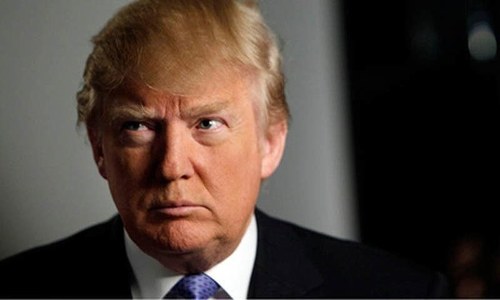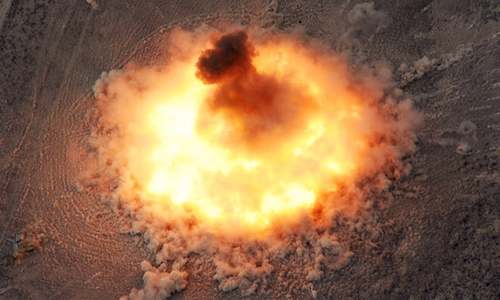HERE we go again: even before the dust from the American missiles launched against a Syrian air base had settled, and the dead from the giant MOAB bomb in Afghanistan had been buried, an American fleet is heading towards the Korean peninsula. The Chinese normally use diplomatic language, but in this case, their foreign minister has bluntly warned of “storm clouds over the Korean peninsula”, and spoken about “both sides with swords in their hands and with bows bent”.
Obviously, the American sword and bow are far, far more powerful than the Korean arsenal. But a pre-emptive strike against the Democratic People’s Republic of Korea (DPRK)’s nuclear and missile sites would trigger a devastating counter-attack against South Korea. Seoul is close to the border, and risks being flattened by heavy artillery and missiles its northern neighbour has deployed close to the heavily militarised border. This is the factor that has prevented Donald Trump’s predecessors from going down this path.
So what has changed to bring an American task force steaming towards the Korean peninsula? Throughout his campaign, Trump had sworn to halt the North Korean nuclear and missile programmes. His stated approach was to demand that China put pressure on its North Korean neighbour to cease and desist; failing which, the Americans would take whatever steps necessary to de-fang the unpredictable North Korean dictator Kim Jong-Un.
In the event, Trump put his demand to President Xi of China when the two met recently in Florida. But during the meeting, the North Koreans fired off four intermediate range missiles. This was probably a message of defiance to both presidents that it would not be dictated to. China, by far DPRK’s biggest trading partner, has limited political clout in Pyongyang. The wily Kim Jong-Un is aware that Beijing would not pull the plug on his puny economy because the last thing it wants is a wave of economic refugees rushing across the border. Also, China wants to retain a buffer between its territory and South Korea and its large contingent of US troops. Finally, both countries have bitter memories of the Korean War and the American intervention.
So why all this sudden American sabre-rattling around the world? When Trump was elected, I had thought the one positive aspect of his victory was his promise to put America first, and to call a halt to American interventions abroad. But clearly, his isolationist agenda has been hijacked by events as well as by the retired military hawks who surround him. It would seem they have sold him their worldview of a powerful America that is feared and respected around the world. Where Obama was careful and calculating, Trump shoots from the hip.
Above all, he has seen his popularity ratings soar together with the 59 Tomahawk cruise missiles fired against a Syrian target. Clearly, the new American president has tasted blood, and has discovered that flexing his military muscles is a cheap and quick way to get domestic support, and divert attention from his political difficulties in Washington.
But how many more wars will America fight? The country’s military-industrial complex — a power-centre President Eisenhower warned against in the mid-fifties — has an obvious interest in taking America to war at intervals that have become shorter and shorter since Eisenhower. New hardware is tested under battlefield conditions; promotions are quicker; and tactics and training methods are honed. These are just some of the benefits reaped by a state at perpetual war.
Increasingly, in a militarised United States, diplomacy has been assigned the back seat. Now, it is the generals and the spooks who formulate foreign policy while diplomats enunciate and execute it. Currently, the defence secretary, the secretary for homeland security and the national security adviser are all retired generals. Many American politicians are overawed by uniforms, medals and the aura of authority generals wear with such panache. However, as several disastrous wars from Vietnam to Afghanistan have shown, their understanding of political realities in the theatres where they have led has not matched either their image or American military power.
Nevertheless, the American public and politicians continue to accept their advice at the cost of untold lives. The Afghan war is now the longest one in American history at a cost of around a trillion dollars, and shows no signs of ending soon. In Iraq, Obama withdrew most American troops and declared victory, even though the country is still at war. Indeed, the militant Islamic State group was born in the crucible of the Iraqi occupation.
Looking back, we can see what a God-given opportunity 9/11 was for the American military machine. Not only did Al Qaeda provide them with a public enemy with a hated face in Osama bin Laden, it also gave them a blank cheque to bomb and drone real and imaginary enemies anywhere in the world. Suspects could be tortured or killed with impunity, and special forces could launch raids against sovereign states without any questions asked in the media or by the public.
Thus, we now have the ultimate military raptor threatening world peace, with the United Nations sidelined and rendered impotent. Emboldened by this total disregard for international law and human rights, states like Israel and Russia use their military might to further their own agendas. No longer occupying the moral high ground, the United States can hardly pretend to be a beacon of democracy and the rule of law.
Four more years of an unpredictable American president could well see a global conflict erupting, destroying decades spent in the pursuit of peaceful international cooperation, achievements and institutions. But to be fair to Trump, Hillary Clinton was very much a hawk in her own right, and prone to admire senior generals and heed their counsel. So the real, long-term threat comes from the military mindset that has taken root in America.
In ancient Greece, the city-state of Sparta was a warlike nation of warriors who exulted in battle. Have we gone full circle?
Published in Dawn, April 17th, 2017












































